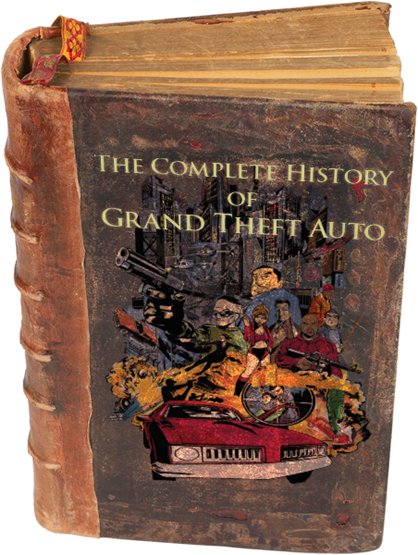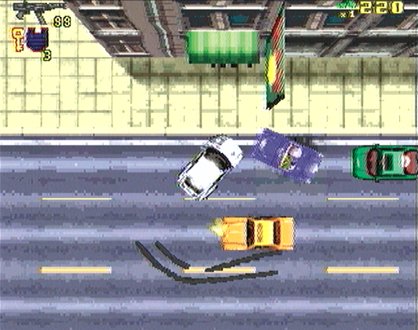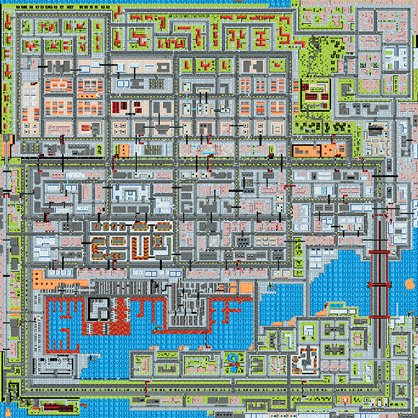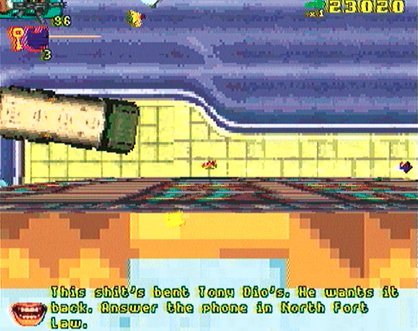Crime doesn’t pay. But virtual crime? That does pay. And by the bucket-load. Even by the time the series reached Florida, it was breaking records in a major way, with Vice City becoming the fastest-selling PS2 title ever - until San Andreas beat it. And that’s despite four million Americans pre-ordering Vice City, and a million more buying it upon its release (in the UK, the Miami Vice-vibed title shifted over a quarter of million units over a single weekend). Both GTA III and Vice City went on to sell well over 10 million units each. San Andreas, meanwhile, sold one million copies in just nine days in the UK alone, going on to top 15 million sales around the world. Astonishing. Total sales of the Grand Theft Auto games are now in excess of 65 million copies.

So GTA is big, but it’s about more than just units shifted and cash generated. Indeed, Vice City’s 2002 release prompted TIME magazine to say that it “will force us to realize that video games aren’t toys anymore; they’re sophisticated, thought-provoking entertainment for grownups. At their best, they’re art.” Not everybody has caught on, even now - six years later and with the release of GTA IV - but it can’t be much longer before games are accepted as entertainment for adults. If only because all the non-gaming haters will die out...
Grand Theft Auto
PSone / PC / Dreamcast / October 1997
Free download

The M-rated/18-certificate gameplay of GTA IV is the pinnacle of an eleven-entry series that began life in 1996 on the Commodore Amiga. As the Amiga grew old and technologically infirm, GTA’s creator, DMA Design, switched the development of the original game to the PC. Grand Theft Auto eventually hit the PSone in 1998, where the mighty Official PlayStation Magazine praised it to the heavens as “one of the most original, innovative, technically impressive and controversial PlayStation releases ever”.
Looking back, the core gameplay elements that define Grand Theft Auto are present in this first title. The game cast you as a small-time car thief with big-time ambitions. Featuring six levels split between three cities - Liberty City, San Andreas and Vice City - there were over 200 vehicle-based tasks to complete. These missions (received via payphones) were often timed, challenging you to ferry passengers across the city chunks, assassinate rival criminals or act as a getaway driver. Complete a mission and you earned greenbacks for your efforts - amass $1,000,000 and you could advance to the next city.

The appeal of GTA wasn’t the way that it looked. The game was functional rather than fancy, using a top-down 2D perspective and crude sprite-based graphics. Instead, GTA’s strength lay in the vast scope of its gameplay and in the freedom it gave you to stray from the guiding mission structure. You could steal cars and sell them at the docks - there were over 20 different vehicle types in each city (all drivable); or set fire to drum-banging groups of Hare Krishna worshippers. You could even rampage through crowds of Saturday shoppers with a machine gun.
GTA gave you entire cities to act disgracefully in, cities that felt real and alive. It reveled in detail. Pedestrians wandered the streets, cars obediently halted at traffic lights, ambulances and fire engines responded to death and fiery destruction. To play this game with any success, you needed to spend time learning the layout of the city to avoid the police, perfecting Micro Machines-style driving on the wide freeways and narrow side-streets. It was easy to ignore the fact that GTA’s gameplay was actually all-too-repetitive. But at the same time, it was also irresistibly immoral, allowing you to live a cartoon life of crime complete with Bullitt style car chases and Heat-style shoot-outs.
Sign up to the GamesRadar+ Newsletter
Weekly digests, tales from the communities you love, and more

Inevitably, GTA’s degenerate gameplay (killing cops, murdering passers-by, stealing cars) stirred up an international controversy. Despite itsmature rating, there were protests against it in Britain and Australia, while other countries - such as Brazil - banned the game altogether, imposing fines on anyone who tried to sell it.
So great was the hoo-ha that GTA’s seediness even became a topic for discussion in the UK Parliament's House of Lords, where crusty peers questioned its impact on impressionable youngsters. An outraged Lord Campbell of Croy asked whether: “[the government] propose to modify the system of classification under which the computer game Grand Theft Auto, which allegedly involves thefts of cars and driving at excessive speeds to evade police cars, has been granted an 18 certificate?” The word ‘allegedly’ implies Lord Campbell had not actually played GTA and was irritated by his assumptions rather than directly annoyed by its often indistinct mayhem. Lord Campbell also didn’t mention what age people should be assumed to be adults, if not at 18. Retirement, perhaps? The Parliamentary Under-Secretary of State for the Home Office (Lord Williams of Mostyn) replied at some length to Lord Campbell’s excellent question, and basically said: “No.”

Lord Campbell, still piqued, would not be swayed from his moral course. “Should criminal offences be allowed to be presented as games?” He ranted. “Is the Government now ready for computer games on burglary and mugging, bearing in mind it is mostly young people who play these games and not the adults who bought them?” Lord Avebury replied: “Demonstration copies of Grand Theft Auto are being distributed with magazines. My 12 year-old son, who has played it, assures me he is not motivated to go out and steal cars.” Could it be that criminals are not innocent victims of games, but criminals? That ordinary gamers will remain just that after playing GTA? The debate raged - the moral minority had clung to an anti-GTA bandwagon without actually seeing or playing it, setting a strong precedent. With its profile boosted by the controversy-press, GTA strode on to become one of the biggest-selling PSone titles of the year. Adults openly adored it, while kids sent their moms to buy it for them, so they could adore it in secret.


